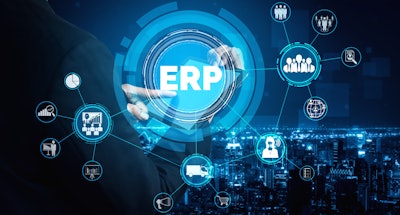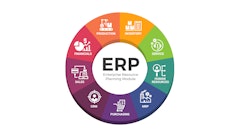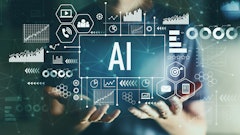
Manufacturing organizations are increasingly turning to artificial intelligence (AI) to enhance their Enterprise Resource Planning (ERP) systems. AI is a category of hyper-automation that is becoming a leading innovation initiative in the manufacturing industry and is instrumental in fulfilling the vision of the Manufacturing 4.0 for the industry. Whether it be for the purpose of improving an organization’s business processes or operations across the supply and value chain, AI solutions will eventually be prevalent across every major business and value chain process that is critical to the manufacturer. AI systems will also play a significant role in the development and features of new products that are produced by the manufacturer.
ERP systems are central to managing complex manufacturing operations as they serve as the primary source databases upon which AI operates. AI can enable new ways to optimize processes, improve decision-making and leverage data more effectively. This article delves into several key aspects of how AI is transforming ERP systems in manufacturing.
How Are Manufacturing Organizations Currently Using AI in Their ERP Systems?
Manufacturing organizations are utilizing AI in several impactful ways. AI-driven analytics are becoming integral to forecasting, demand planning, and inventory management. By analyzing historical data and recognizing patterns, AI algorithms can predict future demands more accurately, helping manufacturers avoid overproduction or stockouts. Moreover, AI is being leveraged to optimize production schedules, balancing machine workloads and human resources more efficiently.
Additionally, AI in ERP systems is enhancing quality control processes. AI algorithms can analyze data from production lines in real-time to detect anomalies, reducing the likelihood of defects. Machine learning models are also used to predict when machinery will require maintenance, minimizing downtime by allowing for proactive interventions. This predictive maintenance approach, enabled by AI, is particularly valuable in complex manufacturing environments where equipment failures can lead to significant production losses.
How Can AI Amplify the Impact of the Latest Wave of Manufacturing ERP Technologies?
The last wave of manufacturing ERP technologies includes significant advancements in data integration, automation, and real-time monitoring. AI amplifies these impacts by adding a layer of intelligence and adaptability. For instance, while traditional ERP systems automate tasks based on predefined rules, AI can dynamically adjust processes in response to changing conditions. This adaptability is crucial in manufacturing environments where variables such as supply chain disruptions or changes in customer demand require immediate responses.
AI can also enhance the capabilities of ERP systems in managing complex supply chains. Through advanced analytics, AI can identify inefficiencies and suggest optimizations that were previously undetectable. Furthermore, AI can improve supplier relationship management by analyzing historical data to identify the most reliable suppliers, predict potential delays and suggest alternative suppliers when necessary.
How Can AI Make IoT/IIoT Better?
The Internet of Things (IoT) and the Industrial Internet of Things (IIoT), key components of the industry’s Manufacturing 4.0 initiative and framework, are revolutionizing manufacturing by connecting devices and systems to collect and analyze data in real time. AI can take this a step further by enabling these systems to learn from the data they collect. For example, AI algorithms can analyze sensor data from IIoT devices to predict when machines are likely to fail, allowing for preemptive maintenance.
AI can also improve the efficiency of IoT/IIoT by optimizing the data flow and reducing the amount of irrelevant data that needs to be processed. By applying AI at the edge, near the data source, unnecessary data can be filtered out, ensuring that only relevant information is sent to the central ERP system. This reduces latency and enhances the responsiveness of the entire manufacturing process.
Moreover, AI enables more sophisticated analysis of IoT/IIoT data, such as identifying correlations between different data points that human analysts might miss. This can lead to new insights and innovations in manufacturing processes, such as optimizing energy usage or reducing material waste.
How Can AI Make Mobility Better?
Mobility in manufacturing ERP systems is becoming increasingly important as organizations seek to empower their workforce with real-time access to information, regardless of location. AI enhances mobility by enabling more natural and intuitive interactions with ERP systems through voice and text interfaces. These AI-driven interfaces allow employees to retrieve information, input data, and execute commands using natural language, significantly improving user experience and reducing the learning curve.
For instance, a production manager could use a voice command to ask the ERP system for the status of a particular production order or to reschedule a job without needing to navigate through complex menus. Similarly, AI-powered chatbots integrated into ERP systems can assist employees in finding information or troubleshooting issues in real time, enhancing productivity and reducing downtime.
These AI-driven interfaces are particularly valuable in environments where hands-free operation is crucial, such as on the factory floor. By allowing workers to interact with the ERP system using their voice or text, AI helps to streamline operations and improve efficiency.
How Can AI Increase the Benefits of Application Integration and Business Process Management?
AI can significantly enhance the benefits of application integration and business process management (BPM) within ERP systems. Traditional ERP systems often struggle with integrating data and processes across various applications and departments, leading to silos and inefficiencies. AI can overcome these challenges by facilitating seamless integration and enabling more intelligent process automation.
Through machine learning, AI can analyze data from disparate sources and identify patterns that inform better decision-making. For example, AI can optimize supply chain processes by integrating data from procurement, production, and logistics systems to create a more cohesive and efficient operation. This level of integration helps ensure that all parts of the manufacturing process are aligned, reducing delays and improving overall efficiency.
In BPM, AI can identify bottlenecks in processes and suggest improvements. It can also automate complex workflows by learning from historical data and predicting the most efficient paths. This not only speeds up processes but also reduces the likelihood of human error, leading to more consistent and reliable operations.
How Can AI Increase the Value of Enterprise-Wide Data Lakes?
Data lakes have become essential in manufacturing for storing vast amounts of structured and unstructured data from various sources. However, the true value of these data lakes is only realized when the data is analyzed and used to drive business decisions. This is where AI comes into play.
AI enhances the value of enterprise-wide data lakes by providing the tools needed to analyze and extract insights from the data. Through machine learning and advanced analytics, AI can uncover patterns and trends that would be impossible to detect through manual analysis. This can lead to innovations in product design, improvements in production efficiency, and more effective marketing strategies.
Moreover, AI can automate the process of data management within data lakes, categorizing and tagging data to make it more accessible for analysis. This reduces the time and effort required to prepare data for analysis, allowing organizations to focus on deriving actionable insights. Additionally, AI can help in maintaining the quality and integrity of the data within the lake, ensuring that decisions are based on accurate and up-to-date information.
AI is rapidly transforming ERP systems in manufacturing by enhancing their capabilities and enabling new levels of efficiency and innovation. From improving demand forecasting and supply chain management to optimizing IoT/IIoT systems and enhancing mobility, AI is a critical driver of the next generation of ERP systems. As manufacturing organizations continue to adopt AI, the benefits will only grow, leading to smarter, more agile and more competitive operations.

![Pros To Know 2026 [color]](https://img.sdcexec.com/mindful/acbm/workspaces/default/uploads/2025/08/prostoknow-2026-color.mduFvhpgMk.png?auto=format%2Ccompress&bg=fff&fill-color=fff&fit=fill&h=100&q=70&w=100)







![Pros To Know 2026 [color]](https://img.sdcexec.com/mindful/acbm/workspaces/default/uploads/2025/08/prostoknow-2026-color.mduFvhpgMk.png?ar=16%3A9&auto=format%2Ccompress&bg=fff&fill-color=fff&fit=fill&h=135&q=70&w=240)








